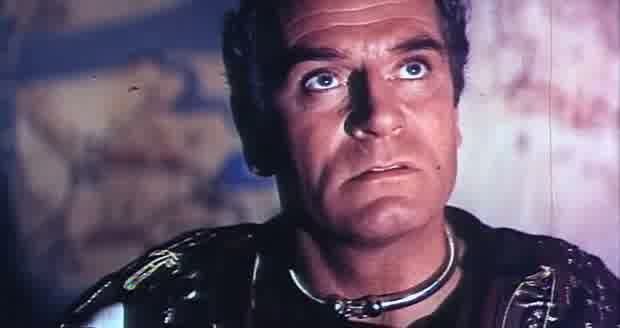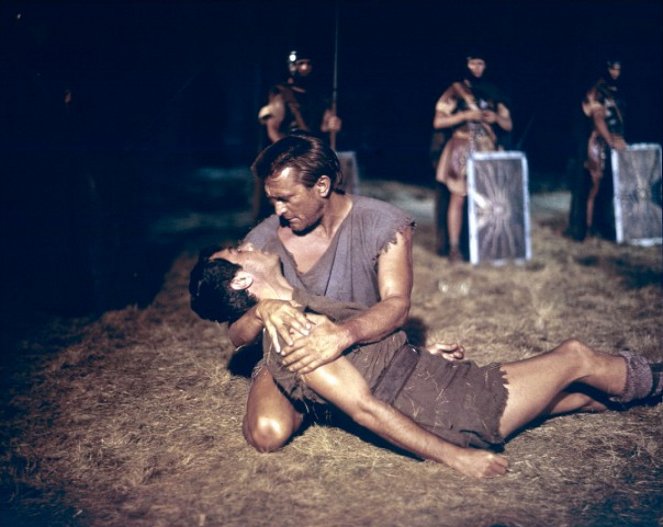Regie:
Stanley KubrickKamera:
Russell MettyMusik:
Alex NorthBesetzung:
Kirk Douglas, Laurence Olivier, Jean Simmons, Charles Laughton, Peter Ustinov, John Gavin, Nina Foch, John Ireland, Herbert Lom, John Dall (mehr)Inhalte(1)
Im 1. Jahrhundert v. Chr. wird der thrakische Sklave Spartacus an eine Gladiatorenschule in Italien verkauft. Dort entfesselt er eine Revolte und wird zum Anführer des größten Sklavenaufstands in der Geschichte Roms. (ORF)
Videos (2)
Kritiken (5)
Spartacus weckt bei mir den Eindruck, als ob ihn Kubrick nicht zum Vergnügen aufgenommen hat, sondern für das Studio. Visuell und schauspielerisch ist der Film auf einem hohen professionellen Niveau, er entspricht der besten Tradition von historischen Hollywood-Epen. Aber innerlich fehlt ihm etwas, was ihn geistig verbinden würde, was visionär selbstsicherer wäre.
()
Nachdem sich die Starz’ der Spartacus-Legende angenommen haben, wird diese nie wieder dieselbe sein. Woran das Team von deKnight, Tapert, Donen und Raimi vier Jahre lang gearbeitet hatte, wurde hier auf völlig schlampige Weise auf einen Haufen geworfen. Douglas' Spartacus ist ein gewöhnlicher Hollywood-Held ohne Ehrfurcht und Vorwürfe, und das Ganze steht und fällt mit den faktischen schauspielerischen Leistungen von Olivier, Laughton und Ustinov. Letztendlich war der einzige, den ich wirklich geschätzt habe, Herbert Lom. Und Jean Simmons möchte ich nie wieder sehen.
()
Kubrick really liked the narrator in the background, and it is with his voice that this famous historical epic begins, along with the film "Fear and Desire." It is the only film on which Kubrick did not contribute as a screenwriter, or at least his name is not mentioned as the author or co-author of the screenplay in the credits. It is also one of the few Kubrick films that I have never seen before, even though there was a period when I wanted to watch everything he directed. These films also include "Full Metal Jacket" and "Eyes Wide Shut," which may be a bit surprising. Kubrick's absence from the screenplay is due to the fact that he was not the original intended director, he became the director only after a week of filming when Douglas and his production company refused to continue working with Anthony Mann. This arrangement ultimately led to it being a truly commissioned film, where Kubrick could not do as he pleased. Nevertheless, or perhaps precisely because of that, he directed the highest-grossing film of his time. Kubrick made a film that was reflective of its time, Douglas made up for his disappointment in not becoming the star of "Ben Hur." It is an excellent historical epic, grandiose, sometimes literally bombastic, especially in terms of large scenes, strong in its more intimate and modest passages, but I can't help but feel that it doesn't deviate so much as a historical film "Spartacus," at least in terms of direction, and is rather powerful in terms of its story. However, that is also because at that time, many strong historical epics were made. Kubrick handles grand battle scenes brilliantly, which later is not so common for him, as he focuses on less impressive scenes, and this is also because he realized that exteriors are not his strong suit.
()
Despite my high expectations, I was disappointed. The creators did not take advantage of the film's extensive running time to strive for historical accuracy (I understand that no one knows precisely how it was back then, but it was still possible to stick to specific reference points). They dedicated a significant amount of time to shots of children and older co-slaves in an apparent attempt to tug at the viewers' heartstrings. Due to these unnecessary digressions, Spartacus never actually becomes a gladiator in this movie, and the liberation of slaves is limited to exclamations of "Come with us!" and it all seems as if the slaves only perform their duties so that they wouldn't be bored all day. I felt like I was reading a book with occasional pages and even entire chapters missing. Plus, the Americans portrayed Spartacus as an idiot who openly confides in his enemies about his strategic goal for no legitimate reason (such as a knife to his throat or sensitive parts over an open fire). I understand that the film is pretty old, but I have recently seen some similarly old films that didn't feel as archaic. There were a few minor details I liked about the movie, but I found it mostly disappointing. / Lesson learned: If you're making a historical film, it's not enough to just remember a few names (although they are often complicated). 3*
()
Although Kubrick didn’t have as free a hand in making Spartacus as he was used to with other projects, the result almost without exception matches his greatness as a filmmaker. A visual and aural work of megalomania that may lack a strong and unifying emotional element, but for future generations of viewers will always remain entertaining, thematically worthy, and utterly captivating, exactly in the tradition of the big Hollywood sword-and-sandal epics. It’s impossible to imagine Spartacus as anyone other than Kirk Douglass, Laurence Olivier must be a descendant of the proud Crassus, and on the director's chair it’s simply impossible to think of anyone other than Kubrick, who brought all those unforgettable scenes with thousands of extras to chilling perfection. 85%
()



Werbung